Yes, the Internet Is Broken. But What Does a Fix Look Like?

Tuesday was the 35th anniversary of the day that Tim Berners-Lee of the European Organization for Nuclear Research wrote the memo proposing what became the World Wide Web. Queen Elizabeth II knighted him in 2004 for his achievement.
I think it’s fair to say, though, that most people are not in the mood to celebrate what has become of Sir Timothy’s invention. It’s common to hear that the internet is broken and that social media is a dumpster fire. Recent case in point: On Wednesday the House voted to force the Chinese owners of TikTok to sell it, or be banned from the United States, on the grounds that it has become a channel for what the House majority leader called Chinese “data collection and propaganda.”
Technology types are working on cures for what ails the internet, and their cures are, no surprise, technological. I’ve been reading up on some of them. A lot go in the right direction, but I haven’t seen anything that seems likely to fully solve the many problems of today’s internet, from invasions of privacy to incitements of violence.
That’s a tall order. Fortunately, a lot of smart people are taking the issues seriously. Lasting solutions, if there are any, are likely to come from a combination of technological, legal and cultural approaches.
Back to the nerds: On Tuesday Berners-Lee published an open letter on Medium that said the web was intended “to be a tool to empower humanity” that “was decentralized with a long tail of content and options.” In the past decade, though, he wrote, “instead of embodying these values, the web has instead played a part in eroding them.”
Berners-Lee is developing and proselytizing for a new system that gives each person his or her own personal online-only data store, or POD for short. The PODs let people decide how their data is managed, used and shared. The Flanders region of Belgium has already authorized PODs for all of its citizens, Berners-Lee wrote. He co-founded a company, Inrupt, that’s built on the concept of PODs and the computer servers associated with them.



